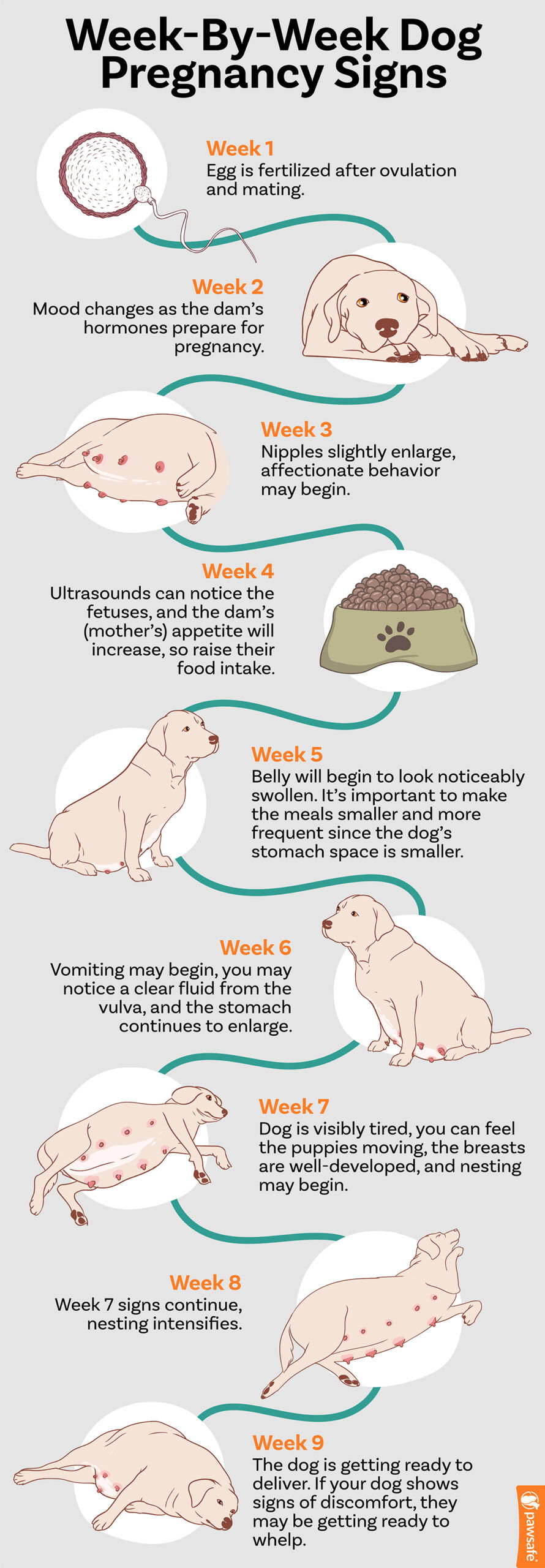
Pregnancy Symptoms in Dogs: A Comprehensive Guide
Pregnancy, a transformative journey for both humans and animals, is a remarkable process that involves significant physiological and behavioral changes. In dogs, pregnancy, also known as gestation, typically lasts for approximately 63 days, with variations between breeds and individual animals. Understanding the signs and symptoms of pregnancy in dogs is crucial for responsible pet ownership, enabling timely veterinary care and ensuring the well-being of both the mother and her litter.
Early Pregnancy Symptoms
- Enlarged abdomen: As the puppies grow, the uterus expands, causing the abdomen to gradually enlarge. This change may become noticeable around 3-4 weeks of gestation.
- Weight gain: A gradual increase in weight is expected as the puppies develop and the uterus grows. However, excessive weight gain should be monitored and discussed with a veterinarian.
- Increased appetite: Pregnant dogs often experience an increased appetite to support the nutritional demands of gestation.
- Nesting behavior: As the due date approaches, dogs may start exhibiting nesting behavior, such as gathering blankets or toys and creating a comfortable space for whelping.
- Changes in temperament: Some dogs may become more affectionate or protective during pregnancy, while others may show signs of irritability or mood swings.
Mid-Pregnancy Symptoms
- Fetal movement: Around 4-5 weeks of gestation, the puppies begin to move, which can be felt as gentle fluttering or rolling sensations in the abdomen.
- Mammary gland development: The mammary glands enlarge and become more prominent, preparing for milk production.
- Vaginal discharge: A clear or slightly milky discharge may be observed, especially towards the end of pregnancy.
- Increased thirst and urination: The increased blood volume and metabolic rate during pregnancy lead to increased thirst and urination.
- Behavioral changes: Pregnant dogs may become more lethargic or less active as their energy is directed towards supporting the developing puppies.
Late Pregnancy Symptoms
- Increased restlessness and panting: As the due date approaches, dogs may become restless and pant more frequently due to hormonal changes and discomfort.
- Temperature drop: A slight drop in body temperature (below 100°F) can occur within 24 hours of whelping.
- Loss of appetite: Some dogs may experience a loss of appetite as the uterus presses against the stomach.
- Dilated cervix: A few days before whelping, the cervix begins to dilate, allowing for the passage of the puppies.
False Pregnancy Symptoms
In some cases, dogs may exhibit symptoms that resemble pregnancy but are not actually pregnant. This condition, known as false pregnancy or pseudopregnancy, can occur after a heat cycle, even if the dog has not been bred. Symptoms of false pregnancy include:
- Enlarged abdomen
- Weight gain
- Mammary gland development
- Vaginal discharge
- Nesting behavior
- Changes in temperament
False pregnancy typically resolves within a few weeks without intervention. However, if the symptoms persist or worsen, veterinary attention is recommended to rule out any underlying medical conditions.
Veterinary Care During Pregnancy
Regular veterinary checkups are essential throughout pregnancy to monitor the health of both the mother and the puppies. The veterinarian will perform physical examinations, check for fetal heartbeats, and provide guidance on nutrition, exercise, and other aspects of prenatal care.
Nutrition
Pregnant dogs require a high-quality diet that provides adequate calories, protein, and essential nutrients. The veterinarian may recommend a specialized pregnancy formula or advise on adjusting the regular diet to meet the increased nutritional demands.
Exercise
Moderate exercise, such as daily walks, is beneficial for pregnant dogs. However, strenuous activity or jumping should be avoided, as it can put unnecessary strain on the uterus.
Other Considerations
- Deworming: Pregnant dogs should be dewormed to prevent the transmission of parasites to the puppies.
- Vaccinations: Ensure that the mother is up-to-date on vaccinations to protect both her and the puppies from infectious diseases.
- Whelping box: Prepare a whelping box or designated area for the mother to give birth in a safe and comfortable environment.
Conclusion
Understanding the symptoms of pregnancy in dogs is essential for responsible pet ownership and ensuring the well-being of the mother and her litter. By recognizing the early signs and monitoring the progression of pregnancy, owners can provide timely veterinary care and create a supportive environment for this transformative journey. Regular checkups, proper nutrition, and appropriate exercise are crucial for the health and safety of both the mother and her puppies.